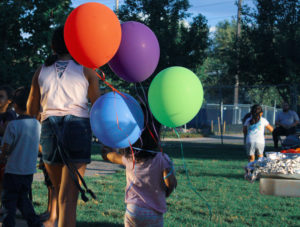Picture this:
Jordan Bailey, Philanthropiece’s Field Coordinator, walking into a local “friendly bank” with a community member to accompany them while opening a bank account using an ITIN (Individual Taxpayer Identification Number).
Martha Marquez, Philanthropiece AC Mexico’s Executive Director, giving a workshop on consumerism to attendees of “Cafecitos Financieros” (financial education classes) during her visit to Colorado.
Maria Elena Lopez, member of the locally-based community savings group Grupo 63, sharing her first-hand experiences of saving with fellow community members to Boulder Housing Partners residents.
These scenes and many others have unfolded over the past year as Philanthropiece has moved forward with its local economic justice initiative. The focus on economic justice (EJ) began in large part in March of 2019, as Philanthropiece launched its Community Savings Group (CSG) pilot program. As the year progressed, the EJ program has developed in ways that speak to the heart of Philanthropiece’s work – through building collaborative relationships, listening deeply and meeting community members where they are at.

credit: Joshua Hoehne
Economic justice is built on the idea that institutions and established policies should share resources, benefits and opportunities equitably amongst an economy’s participants. Philanthropiece leverages the power and privilege of the foundation to research, understand, and address economic injustice in our community. By working directly with both targeted populations and the agencies and institutions that serve (or don’t serve) them, Philanthropiece intends to break down barriers at the individual, institutional, and ideological level. They believe that economic justice work can take on a variety of forms, recognizing that tools such as financial education training and community savings groups can serve as a path towards personal financial stability, community solidarity, and alternatives to predatory financial systems.
“There are lots of things that can fall under economic justice. Wage theft, systems around employment, gender and racial pay gaps. In our minds, any of those things would fall under economic justice. It is a very wide-reaching spectrum. What we have been trying to define is what we do about it,” says Jake Matlak, Philanthropiece’s Director of Programs.
To refine Philanthropiece’s EJ programming focus, Jordan Bailey and the Philanthropiece team used community savings groups as a jumping-off point. Jordan reached out to local organizations and community members who might find value in the opportunities of CSGs. Through these efforts, Bailey made a connection with Ingrid Castro-Campos, Program Manager at Boulder Housing Partners (BHP). This meeting led to a series of presentations on CSGs that Jordan gave to BHP residents and their friends and family. While several people expressed interest in CSGs, it became evident that more work was needed to strengthen the connections between attendees.
“We realized that there was something else missing. The community sense was not yet there. People were a little hesitant, asking ‘How would this work?’ We realized that we needed to do more relationship and trust building within that group. Some of them have been neighbors for a long time but when you are talking about money, that relationship really needs to be very strong,” says Ingrid.
To create more trust and to better understand their concerns around economic issues, Ingrid and Jordan continued meeting with community members. Born out of these meetings was a series of financial wellness workshops called “Cafecitos Financieros”. These workshops, convened around a table with ample coffee and food, have taken place over the past several months and have included topics such as budgeting, credit scores, college investment/529 accounts and consumerism. These topics were chosen by the participants in a series of discussions and surveys. Realizing that they did not possess the expertise to give presentations on all the financial subject matter, Jordan and Ingrid began leveraging local relationships to help with the Cafecitos. They collaborated with Boulder County Housing and Human Services to enable three Workforce-led presentations to the ‘Cafecitos’ and to offer one-on-one counseling between participants and HHS’s Financial Specialist program. Jordan has also created relationships with private investment firms who are willing to offer bilingual financial education to interested community members.

A pair of sisters connects at a BHP community barbecue.
While the ‘Cafecitos’ have taken on momentum in their own way to offer financial information to residents, they have also helped to build up trust and familiarity amongst participants. With more established rapport, Boulder Housing Partners residents decided to form two separate community savings groups. Along with these two groups, another savings group formed out of a collaboration with Intercambio, a local nonprofit. And the original CSG, Grupo 63, has continued to meet and save over the past year. They have had some significant accomplishments, including lending out two home loans to members, helping another member get out of collections and helping another member cover an emergency surgery for their parent. During a recent Grupo 63 meeting, as the individual savings totals were shared with the group, one member turned to Jordan to express her surprise and delight.
“She looked and me and said ‘I would never have been able to save that amount without this program!’” explains Jordan.
Even with the growth and personal successes of community savings groups, Jordan noticed another theme start to emerge as he continued reaching out to community members and meeting with local organizations. That theme centered around people wanting (but not always achieving) equitable access to formal banks.
“Banking is one area that arose from listening to the community – having lots of conversations, sitting with people in their homes, attending regional meetings. We were asking ‘What is going on in the community? What are resources you have or don’t have? What are resources that are unjust? What’s working, what’s not?’” explains Jordan.
Born out of this idea that people were interested in access to banks, Philanthropiece created its “Friendly Bank” initiative. The intention is to work with community banks, credit unions and small regional banks who meet a set of “friendly” guidelines. These include offering flexible ID options, free checking accounts, no hidden fees, bilingual staff and contact persons at bank branches, and the ability to waive fees. Thus far, Philanthropiece has identified six local banks that meet these criteria. However, the program continues to evolve, as people reach out to Jordan on an individual basis.
“A big part of this program is advocating and accompanying. It constantly grows. For example, maybe somebody hears Jordan’s presentation and they go to a bank to open an account and they run into a challenge. So, they reach out to Jordan and then Jordan follows up with the bank or actually goes to the bank with the person. That kind of advocacy, untangling confusing language or policies, that is a big part of Jordan’s work,” explains Jake Matlak.
While this one-on-one advocacy can be time-consuming, it is a very intentional part of the way Philanthropiece develops programs and stays centered on community members and the experiences they are having around issues of economic justice.
“The reason we are doing it this way is that we are learning every time we walk through the doors of a bank. We are, in a way, walking in the shoes of an immigrant or a Spanish speaker or someone who doesn’t have a social security number. We are walking in their shoes and we can feel it, we can have a little bit more understanding and compassion for what they are going through,” says Jordan.
This has helped Jordan and the Philanthropiece team to craft the Friendly Bank guidelines and to continue evolving the initiative as more information is discovered. Over the long-term, Philanthropiece aims to open-source this information to other interested organizations and nonprofits. It also intends to continue evolving its overall economic justice work by staying true to its core philosophy.
“Right now, we are building relationships and trust across the board. We are learning and listening. We are not the first to be paying attention to these issues or to do work around it, so we are trying to learn from what’s already been done, to not repeat, to connect the work that’s already happening and to be innovative,” says Jake.
Morning Glory is Philanthropiece Foundation’s Content Manager and Editor. She also serves on the foundation’s Advisory Board.

